News
Ground-breaking scientific drilling begins in western NSW
Published:28 April 2023
Ground-breaking scientific drilling has begun in western New South Wales, promising to offer valuable insights into the geological history of the region, as well as the changes that have shaped our continent.
The drilling project, a partnership between research organisation MinEx CRC, Geoscience Australia’s Exploring for the Future program and the Geological Survey of New South Wales, brings together government and university geoscience researchers to gain a better understanding of what lies under our feet across the region.
Chris Lewis, Geoscience Australia Director of Regional Geology and Drilling said rock samples would be collected at depths of up to 800 meters below the Earth's surface between Broken Hill and Wentworth.
“These samples will help us to answer questions about the Delamerian Orogen, a geological region that lies along the New South Wales and South Australian border that formed around 500 million years ago,” Mr Lewis said.
“While sections where rocks stick out of the ground are relatively well understood, most of it is covered by younger rocks and sediments.
“This project concentrates on unravelling the secrets of this poorly understood section of the Orogen.”
In addition to conventional diamond drilling, the program will utilise the MinEx CRC RoXplorer CT drilling platform, designed in collaboration with industry partners Anglo American, BHP, Epiroc, South 32, Wassara and the Mineral Research Institute of Western Australia (MIRWA).
Andrew Bailey, MinEx CRC CEO, said new exploration technology was crucial for a sustainable resources future.
“The CT drilling platform occupies a drill site of 20 x 20 metres, significantly smaller than required for conventional drill rigs in a comparable drilling scenario.”
“The RoXplorer CT drilling platform is a complete mobile sampling system. It is set up faster, drills faster and mobilises faster, with significantly lower impact” he said.
Mr Lewis said western New South Wales played an important part of Australia’s resources industry.
“The data gathered as part of this project could identify new mineral resources such as gold, copper, and nickel deposits as well as those essential for clean energy technologies such as solar panels, wind turbines, and electric car batteries. This helps pave the way to net zero emissions by 2050,” Mr Lewis said.
“This project may also help locate precious groundwater resources that could improve water security in parts of New South Wales.
“It is hoped that our findings will build on the existing knowledge of natural resources in the region by providing data as part of a larger project assessing the mineral potential across New South Wales, South Australia, Victoria and Tasmania, and providing insight into the geological evolution of eastern Australia.
“The data will be of immense use to all natural resource managers and will have a flow-on effect to the regional economy.”
The stratigraphic drilling program runs between March and May and is coordinated by partners and Geoscience Australia, the public service agency that provides technical advice on all aspects of geoscience to the Australian government.

